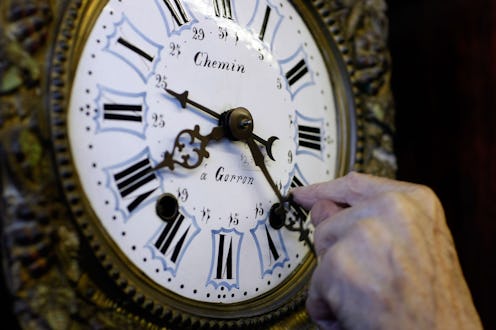News
6 Pros & Cons Of Daylight Saving Time, Because There's A Push To Make It Permanent

Changing your clock by an hour twice a year may sound simple, but there have been endless arguments about the pros and cons of daylight saving time. More recently, three Florida lawmakers have introduced legislation on the issue that's pretty straightforward: keep America in daylight saving time for good.
The bill, called the Sunshine Protection Act of 2019, was introduced by Sens. Marco Rubio, Rick Scott, and Rep. Vern Buchanan of the GOP in early March. "I was glad to sign legislation as Governor to continue Daylight Saving Time year-round for Floridians, and now join Senator Rubio to lead this effort in Congress," Scott said in a press release. "The Sunshine Protection Act will allow Floridians and visitors to enjoy our beautiful state even later in the day, and will benefit Florida’s tourism industry, which just celebrated another record year."
President Trump has even weighed in on the seemingly contentious subject of daylight saving time on Twitter. Trump wrote on Monday morning, "Making Daylight Saving Time permanent is O.K. with me!"
With lawmakers pushing to give Americans across the country an extra hour of daylight and Trump giving it a thumbs up, it's worth checking out a few arguments for and against daylight saving time.
Pro: More Revenue For Companies
Business owners seem to throw their support behind daylight saving time. In 2010, a lobbying group for convenience stores, The Association for Convenience and Fuel Retailing, told The New York Times that daylight saving time earned the convenience store industry an annual revenue of $1 billion since it began practicing it in 1986.
It seems to make sense. With more daylight, people are likely to go outside, perhaps drive (which means more money spent on gas if you own a car), and possibly shop more, as Vogue noted in 2017.
Con: It Might Throw Off Your Circadian Rhythm
On the unpleasant side, chronobiologists have noted that your natural circadian rhythm — your body's internal clock — may be thrown off by adjusting the clock twice a year. In 2013, chronobiologist Till Roenneberg told The National Geographic, "The consequence of [daylight saving time] is that the majority of the population has drastically decreased productivity, decreased quality of life, increasing susceptibility to illness, and is just plain tired."
Pro: More Sunlight For Activities
Of course, with springing your clock forward by an hour, you naturally have more time to spend in the sun. At least, that's one of the arguments in favor of daylight saving time.
Con: An Initial Spike In Traffic Accidents
In 2015, per CBS News, the University of British Columbia reported that there was an initial 17 percent spike in traffic accidents in the first week of daylight saving time. The accidents go down, according to the research, but this initial increase in mishaps is a con that opponents of daylight saving time often mention.
"It’s this change in people’s sleep patterns that really affects their driving, and many of them just can’t get a good night’s sleep for a few days after daylight saving time is put into effect," Sam Schwartz, an ex-New York City traffic commissioner, told CBS News in 2015.
Pro: Decrease In Crime
In 2015, The Brookings Institute argued in favor of daylight saving time while referring to research that claimed crime fell by an average of 7 percent thanks to the practice, especially robberies. The possible explanation? With sunlight acting as a deterrent, crimes like theft may be harder to carry out.
Con: Agrarian Workers Take A Hit
Farmers don't seem to be fans of daylight saving time. Workers in the agrarian industry need sunlight for harvesting, among other things. Tending to crops requires farmers to be in harmony with the sun's position and timing. With an hour back and forth, these tasks can take a hit.
Love it or hate it, daylight saving time probably won't be going anywhere anytime soon. In the meantime, there's no harm in reading about the little things you can do to make the most of your daylight saving time.